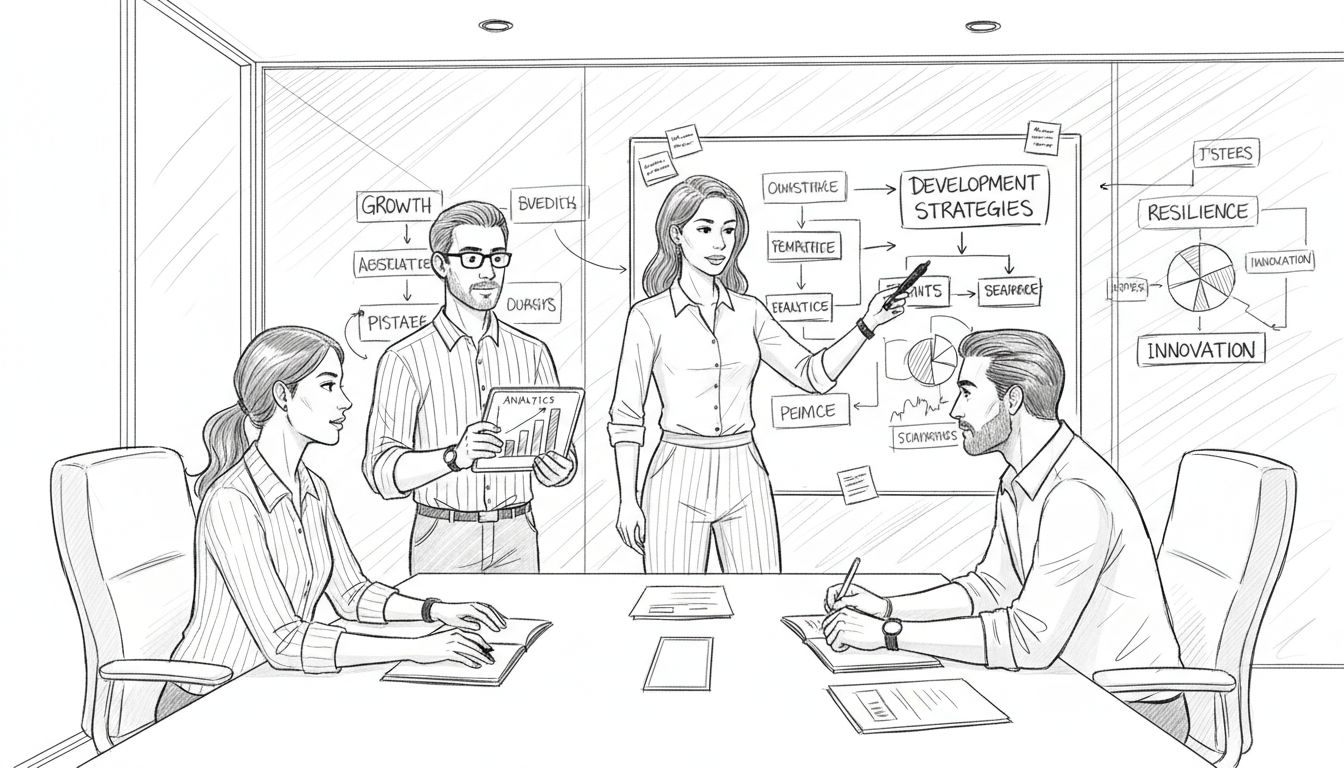Most american entrepreneurs underestimate just how much their mindset shapes business performance. Research shows that a growth mindset drives greater resilience and innovation, while a fixed mindset increases the risk of stagnation. With over 80 percent of business leaders attributing success to adaptable thinking, understanding these psychological frameworks is critical for anyone who wants to thrive in a fast-changing market. This guide unpacks the unseen influence of mindset and empowers you with insights that can change your approach to business for good.
Table of Contents
- Defining Mindset And Its Business Impact
- Types Of Mindset: Fixed Vs. Growth
- How Mindset Shapes Business Success
- Common Misconceptions About Mindset
- Risks Of Neglecting Mindset In Business
- Proven Strategies For Mindset Transformation
Key Takeaways
| Point | Details |
|---|---|
| Mindset Types | Entrepreneurs typically operate with either a fixed mindset, avoiding challenges, or a growth mindset, which embraces learning from opportunities. |
| Business Impact | A growth-oriented mindset fosters resilience and innovation, improving individual and organizational performance dramatically. |
| Risks of Neglect | Ignoring mindset can lead to missed opportunities and stagnation, limiting personal and professional growth. |
| Transformation Strategies | Implementing strategies such as reframing failures and continuous learning can effectively shift one’s mindset towards growth. |
Defining Mindset and Its Business Impact
Your mindset is the invisible architecture that determines how you process challenges, interpret setbacks, and respond to opportunities in business. According to Stanford University, mindset represents the fundamental beliefs that shape an individual’s perception of their abilities and potential for growth.
In entrepreneurial contexts, mindset can be categorized into two primary frameworks: fixed mindset and growth mindset. Entrepreneurs with a fixed mindset believe their talents and intelligence are static traits, leading them to avoid challenges that might expose perceived limitations. Conversely, those with a growth mindset view challenges as opportunities for learning and development. As research from University of Wisconsin-La Crosse indicates, individuals with growth mindsets are more likely to:

- Embrace challenges as learning experiences
- Persist through complex business obstacles
- View failures as opportunities for improvement
- Continuously develop new skills and strategies
The profound business impact of mindset extends beyond individual performance. A growth-oriented mindset creates resilient organizational cultures that adapt quickly, innovate consistently, and transform potential obstacles into strategic advantages. By recognizing that abilities can be developed through dedication and strategic effort, entrepreneurs unlock exponential potential for personal and professional transformation.
Types of Mindset: Fixed vs. Growth
Entrepreneurs navigate complex business landscapes through two fundamental psychological frameworks: fixed mindset and growth mindset. According to research from Massachusetts Institute of Technology, these mindset types dramatically influence how individuals approach challenges, interpret failures, and pursue personal development.
In a fixed mindset, individuals believe their intelligence and talents are static traits. They typically:
- Avoid challenging situations that might expose limitations
- Perceive failures as personal deficiencies
- Resist feedback and criticism
- Feel threatened by others’ success
Conversely, entrepreneurs with a growth mindset demonstrate remarkable resilience. Central Washington University highlights that these individuals:
- Embrace challenges as learning opportunities
- View effort as a path to mastery
- Learn from criticism and feedback
- Find inspiration in others’ achievements
Understanding these mindset types provides entrepreneurs with a powerful framework for personal transformation. By consciously shifting from a fixed to a growth mindset, business owners can unlock unprecedented potential, turning obstacles into strategic advantages and continuous personal development.
 The choice of mindset isn’t just psychological – it’s a fundamental business strategy that determines long-term success and adaptability.
The choice of mindset isn’t just psychological – it’s a fundamental business strategy that determines long-term success and adaptability.
How Mindset Shapes Business Success
Entrepreneurial success is fundamentally rooted in an individual’s psychological approach to challenges and opportunities. Thomas Edison State University research reveals that business success is less about inherent talent and more about the mindset entrepreneurs bring to their professional journey.
The transformative power of a growth mindset becomes evident in how entrepreneurs navigate complex business landscapes. Successful business owners understand that challenges are not roadblocks, but stepping stones to innovation and personal development. According to insights from Technovation, entrepreneurs with a growth mindset demonstrate distinctive characteristics that drive business success:
- Resilience in face of setbacks
- Continuous learning and skill adaptation
- Willingness to experiment and take calculated risks
- Openness to feedback and collaborative problem-solving
Mindset ultimately determines an entrepreneur’s capacity to pivot, innovate, and sustain long-term success. Those who view challenges as opportunities for growth create a dynamic business environment that attracts talent, inspires innovation, and generates breakthrough strategies. By consciously cultivating a growth-oriented perspective, entrepreneurs transform potential obstacles into strategic advantages, ensuring their businesses remain adaptable and competitive in an ever-changing marketplace.
Common Misconceptions About Mindset
Mindset is a complex psychological framework often misunderstood by entrepreneurs and business professionals. QED Foundation research challenges several pervasive myths about intelligence and personal potential, revealing that our abilities are not fixed but can be developed through dedicated effort and strategic learning.
One of the most damaging misconceptions is the belief that intelligence and talent are purely innate. This static view prevents many entrepreneurs from exploring their true potential. Common myths about mindset include:
- Talent is predetermined and cannot be significantly improved
- Intelligence is a fixed trait that doesn’t change
- Natural ability matters more than consistent effort
- Failure indicates a permanent lack of capability
- Success comes only to those with inherent genius
In reality, entrepreneurial success is less about initial talent and more about psychological adaptability. Successful business owners recognize that skills can be learned, challenges can be overcome, and personal growth is a continuous journey. By rejecting these limiting beliefs, entrepreneurs unlock their capacity for innovation, resilience, and transformative personal development. The most powerful skill an entrepreneur can cultivate is the belief that they can expand their capabilities through persistent learning, strategic effort, and an open mindset.
Risks of Neglecting Mindset in Business
Neglecting mindset can be a silent business killer that undermines entrepreneurial potential and organizational growth. East Georgia College research highlights the profound consequences of maintaining a rigid psychological approach to business challenges, revealing how a fixed mindset can dramatically impair professional performance and innovation.
The risks of mindset neglect manifest in several critical ways that can stunt business development. According to Clemson University, entrepreneurs with a fixed mindset are prone to detrimental behaviors that undermine long-term success:
- Avoiding challenging opportunities out of fear of failure
- Refusing to adapt to changing market conditions
- Interpreting constructive feedback as personal criticism
- Giving up quickly when confronted with complex problems
- Resisting learning new skills or technologies
Ultimately, mindset neglect transforms potential opportunities into insurmountable barriers. Successful entrepreneurs understand that their psychological framework is not a fixed trait but a dynamic skill that can be developed and refined. By actively cultivating a growth-oriented perspective, business owners can transform challenges into stepping stones, turning potential limitations into powerful drivers of innovation and personal transformation. The most significant risk is not in failing, but in never allowing yourself the opportunity to grow beyond your current limitations.
Proven Strategies for Mindset Transformation
Transforming your mindset requires intentional, strategic approaches that rewire psychological patterns and unlock entrepreneurial potential. Technovation research emphasizes that mindset transformation is not about overnight change, but consistent, purposeful practice that gradually reshapes thinking patterns.
Entrepreneurs seeking meaningful mindset shifts can implement several powerful strategies to cultivate a growth-oriented perspective:
- Reframe failures as learning opportunities
- Practice self-reflection and critical analysis
- Seek constructive feedback from mentors and peers
- Develop a habit of continuous learning
- Challenge existing assumptions and mental limitations
- Embrace uncomfortable situations as growth experiences
Successful mindset transformation demands more than theoretical understanding. It requires active implementation and persistent commitment to personal development. By consciously choosing to view challenges as opportunities for growth, entrepreneurs can systematically dismantle limiting beliefs, build psychological resilience, and create a dynamic mental framework that adapts and thrives in complex business environments. The most powerful transformation happens when individuals recognize that their potential is not predetermined, but continuously expandable through deliberate effort and strategic thinking.
Unlock the Power of a Growth Mindset to Transform Your Business
The article highlights the crucial challenge entrepreneurs face in overcoming limiting beliefs and cultivating a growth mindset that fuels resilience, innovation, and long-term success. If you find yourself stuck in self-doubt or hesitant to embrace risks because of fear of failure or feedback, you are not alone. Many entrepreneurs struggle with the very mindset blocks that hold back their potential. This guide shows how mindset shapes every decision and how shifting to a growth-oriented perspective can turn setbacks into powerful learning moments.
At SimoneCR.com, we specialize in helping entrepreneurs break free from fixed mindset patterns through proven coaching frameworks that integrate mindset shifts, emotional intelligence, and practical business strategies. Whether you need support to reframe failures, build resilience, or develop clarity in leadership and finances, Simone’s holistic approach addresses both the inner work and strategic growth needed for sustainable success without burnout.
Discover how to stop allowing limiting beliefs to stall your progress and start creating a business culture of continuous development and adaptability.
Ready to make the mindset transformation that leads to real business breakthroughs and personal empowerment?
[Image:cta_image]Take the first step today by exploring personalized coaching, courses, and resources at SimoneCR.com. Learn how to apply proven mindset tools alongside strategic business practices so you can embrace challenges as opportunities and unlock your fullest entrepreneurial potential.
Frequently Asked Questions
What is the difference between a fixed mindset and a growth mindset?
A fixed mindset believes that intelligence and abilities are static traits, while a growth mindset views challenges as opportunities for learning and believes that abilities can be developed through effort and persistence.
How can a growth mindset impact my business success?
A growth mindset can lead to greater resilience, continuous learning, and innovation. Entrepreneurs with this mindset see challenges as stepping stones to success, allowing them to adapt and thrive in dynamic business environments.
What are common misconceptions about mindset?
Many believe that talent is innate and cannot be improved, or that failure indicates a permanent lack of capability. In reality, skills can be developed and personal growth is a continuous journey.
What strategies can I use to transform my mindset?
You can transform your mindset by reframing failures as learning opportunities, practicing self-reflection, seeking feedback, embracing uncomfortable situations, and committing to continuous learning.
Recommended
- Complete Guide to Why Mindset Shifts Are Important – Simone CR
- Business – Simone CR
- Mindset Coaching for Business Owners: Complete Guide – Simone CR
- Uncategorized – Simone CR
- The Essential Guide to Benefits of Entrepreneurial Mindset – Nomad Excel – Your Entrepreneurial Adventure Starts Here
- Personal Business Growth: Complete Guide for Entrepreneurs – Nomad Excel – Your Entrepreneurial Adventure Starts Here



